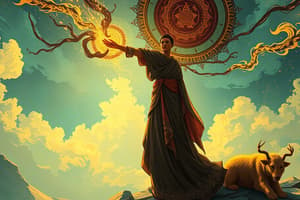Podcast
Questions and Answers
What is the traditional definition of philosophy?
What is the traditional definition of philosophy?
- The pursuit of truth through logical reasoning and empirical investigation
- The study of the fundamental nature of reality, knowledge, values, reason, mind, and language
- The exploration of the meaning of life and the human condition
- The love of wisdom, originating from the Greek words 'philos' (love) and 'Sophia' (wisdom) (correct)
How does philosophy involve both intellectual inquiry and emotional engagement?
How does philosophy involve both intellectual inquiry and emotional engagement?
- Philosophy alternates between intellectual inquiry and emotional engagement, depending on the topic
- Philosophy encompasses a passionate pursuit of truth, akin to the intensity found in romance or poetry (correct)
- Philosophy involves a detached, rational analysis of concepts and ideas
- Philosophy is solely an intellectual exercise, devoid of any emotional component
Who is considered the first philosopher in Western civilization?
Who is considered the first philosopher in Western civilization?
- Plato
- Thales (correct)
- Aristotle
- Socrates
What was Thales' philosophical contribution?
What was Thales' philosophical contribution?
Where is the birthplace of Western philosophy recognized to be?
Where is the birthplace of Western philosophy recognized to be?
What was the fundamental question that Thales posed, according to the passage?
What was the fundamental question that Thales posed, according to the passage?
What does the passage say is the key difference between philosophy and other disciplines?
What does the passage say is the key difference between philosophy and other disciplines?
According to the passage, what is the role of philosophical fundamentals in relation to other forms of knowledge?
According to the passage, what is the role of philosophical fundamentals in relation to other forms of knowledge?
What does the passage suggest is the philosophical aspiration, as noted by philosopher Georg Wilhelm Friedrich Hegel?
What does the passage suggest is the philosophical aspiration, as noted by philosopher Georg Wilhelm Friedrich Hegel?
Which of the following best describes the three key aspects of philosophical activity discussed in the passage?
Which of the following best describes the three key aspects of philosophical activity discussed in the passage?
Flashcards are hidden until you start studying




